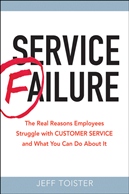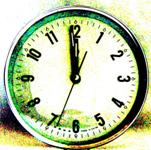How to quickly find lost time and increase productivity
 Jeff Toister
Jeff Toister  Tuesday, May 3, 2011 at 2:15PM |
Tuesday, May 3, 2011 at 2:15PM | My wife, Sally, is an efficiency expert. From my perspective, this gives us plenty of exciting things to talk about at the dinner table. One recent conversation focused on why it takes me five times longer than she to pack for a business trip. You might be able to relate if you consistently find yourself running short of time at work or at home.
Explanation #1: We have different natural abilities
Sally has the ability to visualize what she wants to pack before she starts packing. When it comes time to pack her suitcase she simply goes to her closet, grabs the clothes she visualized, and puts them in.
I can't do that. I process information in a highly kinesthetic manner. When packing for a trip, this means I have to pull all sorts of clothes out of my closet and then imagine how and when I might wear them on my trip. I also have to write down the days I'll be gone and what I'll be doing each day so I can pair an outfit with each activity. (Not doing this almost always results in me over packing but still not having enough clothes to wear.)
Sally's ability to visualize gives her a natural ability to pack faster than I can. Natural ability definitely plays a role in our packing productivity.
Explanation #2: Self-imposed distractions
I usually put the TV on in our bedroom to watch while I pack. This seems like a good way to kill the monotony, but Sally correctly points out that it also slows me down. Each time I pause to pay attention to the television I slow down the process just a bit. This can really add up if something interesting like a Laker game is on.
Sally does all her packing without any distractions. Consequently, she focuses all of her attention on the task at hand and finishes much faster.
Conclusions
If you want to do something more efficiently, you should understand which obstacles are natural and which are self-imposed. The self-imposed obstacles are a lot easier to reduce or eliminate. If I want to pack faster the easiest solution is to simply turn off the TV. I still won't be as fast as Sally, but I'll be a lot faster than I am now.
Where did all the time go?
Sometimes these inefficiencies aren't obvious. A good way to spot pockets of inefficiency is to track your time for a week and then look at the results.
I've created a simple time tracking worksheet that you can use. You can download it here or watch the nifty how-to video.




